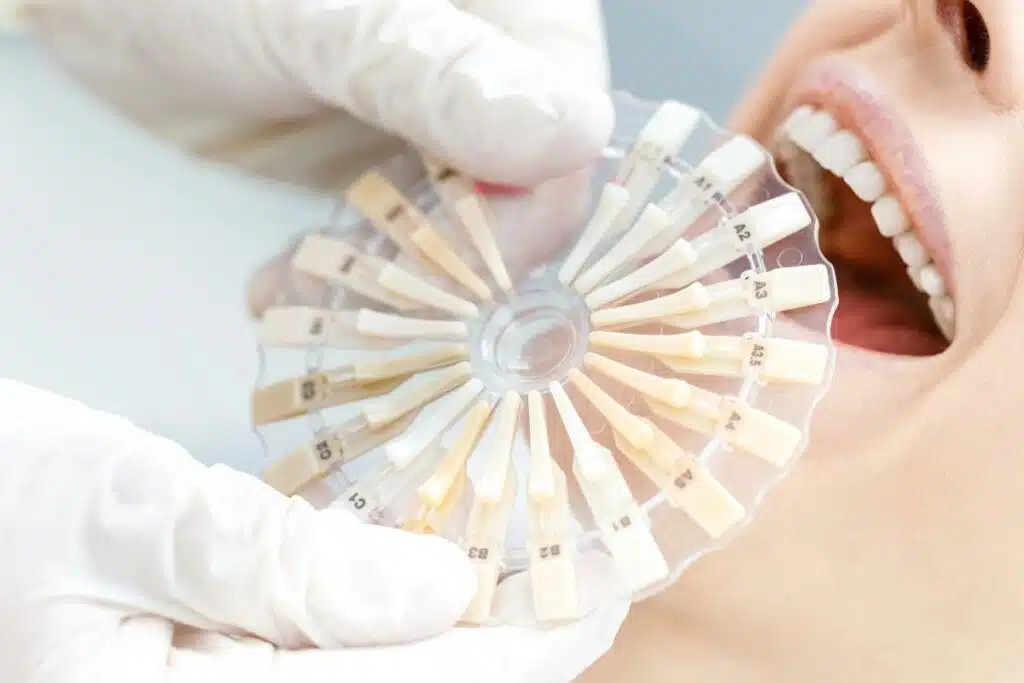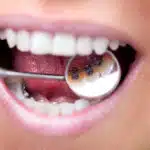Are you interested in the topic of veneers? Here you can find out everything about the treatment, its advantages and disadvantages as well as the risks and costs.
A radiant smile is an important beauty feature for many people. However, your own teeth do not always match your aesthetic expectations.
This is where veneers come into play – wafer-thin veneers that can give teeth a flawless appearance.
But what exactly are veneers, when are they used, how much do they cost, and what are the advantages and disadvantages? Find out everything you need to know about veneers in this article.
| Get 150 € discount on your dental correction! |

Book a consultation appointment now at a nearby DrSmile partner practice and find out if teeth straightening with aligners is right for you.
The appointment is completely non-binding and does not involve any costs.
With the code “THATSMILE150” you will receive 150 € discount on the treatment.
What exactly are veneers?
Veneers are thin, custom-made shells made of ceramic or composite that are applied to the front of the teeth to improve the appearance of the teeth.
They are individually adapted to the shape, size and color of your teeth and then firmly bonded to the tooth.
Veneers are designed to provide a natural aesthetic and help to conceal minor imperfections such as discoloration, wear and tear or slight misalignments.
When are veneers used?
Veneers are often used for esthetic reasons. Here are some typical areas of application:
- Discoloration: If teeth are severely discolored and can no longer be whitened by bleaching, veneers can restore or even improve the natural tooth color.
- Worn and chipped teeth: Veneers can restore the original shape and structure of worn or chipped teeth.
- Misaligned teeth: Slight misalignments or gaps between the teeth can be visually corrected with veneers without the need for extensive orthodontic treatment.
- Uneven tooth shapes: If teeth are different sizes or unevenly shaped, veneers can provide a more harmonious row of teeth.
- Enamel defects: In the case of congenital or acquired enamel defects, veneers can protect the affected tooth and improve its appearance at the same time.

What types of veneers are there?
There are two main types of veneers:
- Ceramic veneers (porcelain veneers): These veneers are made of high-quality ceramic and are characterized by their naturalness and durability. Ceramic veneers are particularly resistant to discoloration and can imitate the translucency of a natural tooth, which leads to a very aesthetic result.
- Composite veneers: These veneers are made from a tooth-colored plastic (composite) and applied directly to the tooth. They are less expensive than ceramic veneers, but also less durable and more susceptible to discoloration.
How does the treatment with veneers work?
The process of applying veneers involves several steps:
- Consultation and planning: First, you will have a consultation with your dentist to discuss your wishes and the feasibility of the treatment. The exact costs and course of treatment will also be clarified.
- Preparing the teeth: The next step is to prepare the teeth. For ceramic veneers, a thin layer (approx. 0.3 to 0.7 mm) of enamel is usually removed to make room for the veneers. With non-prep veneers, a special form of veneers, no grinding is necessary.
- Impression taking: After the teeth have been prepared, an impression of the teeth is taken, which serves as the basis for the fabrication of the veneers. In some cases, this can also be done digitally.
- Fitting and application: Once the veneers are ready, they are placed on the teeth to check their fit and color. If everything fits, the veneers are firmly attached to the teeth with a special adhesive and cured with a special lamp.
- Fine adjustment: After the veneers have been fitted, the bite is checked and the surface is adjusted slightly if necessary to ensure that everything fits perfectly.

How much do veneers cost?
The cost of veneers can vary greatly and depends on various factors, such as the material used, the number of veneers required and the dental practice.
On average, the cost of a single ceramic veneer is between 800 and 1,500 euros.
Composite veneers are cheaper and usually cost between 300 and 600 euros per tooth. If several teeth are treated, the total costs can be correspondingly higher.
In some cases, it may make sense to take out supplementary dental insurance to cover part of the costs.
Who covers the cost of veneers?
As a rule, veneers are considered an aesthetic treatment, which is why statutory health insurance companies do not cover the costs.
However, there are exceptions if the veneers are necessary for medical reasons, for example to treat enamel defects.
In these cases, part of the costs may be covered by health insurance. Private health insurance and supplementary dental insurance may also cover part of the costs, depending on the contract.

Advantages and disadvantages of veneers
Advantages of veneers:
- Aesthetics: Veneers offer an excellent aesthetic solution for various dental problems. They can improve the shape, color and alignment of the teeth and thus contribute to a perfect smile.
- Gentle treatment: Compared to crowns, the preparation of teeth for veneers is minimally invasive, as only a small amount of enamel needs to be removed.
- Durability: Ceramic veneers in particular are very durable and resistant to discoloration. With good care, they can last 10 to 15 years or longer.
- Naturalness: Ceramic veneers are translucent and imitate the natural transparency of tooth enamel, resulting in a very natural appearance.
Disadvantages of veneers:
- Costs: Veneers are a relatively expensive treatment method, especially if several teeth are to be treated.
- Irreversibility: As a thin layer of enamel is usually removed when veneers are applied, the treatment is irreversible. Once veneers have been applied, they must be replaced if necessary.
- Sensitivity: Some patients may experience increased sensitivity to hot or cold food and drinks after treatment, especially with ceramic veneers.
- Risk of breakage: Although veneers are robust, they can break or chip if they are subjected to excessive stress, for example due to teeth grinding. In such cases, they must be repaired or replaced.
Conclusion: When are veneers the right choice?
Veneers are an interesting option for anyone who is unhappy with the aesthetics of their teeth and wants a perfect smile.
They are particularly suitable for people who want to correct slight misalignments, discoloration or worn teeth without undergoing extensive orthodontic treatment.
The decision to have veneers should be carefully considered and made in consultation with your dentist to find the best solution for your individual needs.
With good care and regular visits to the dentist, veneers can guarantee a radiant smile for many years.
| Get 150 € discount on your dental correction! |

Book a consultation appointment now at a nearby DrSmile partner practice and find out if teeth straightening with aligners is right for you.
The appointment is completely non-binding and does not involve any costs.
With the code “THATSMILE150” you will receive 150 € discount on the treatment.
FAQs on the subject of veneers
Here we answer a few of the most frequently asked questions about veneers.
What are veneers and what are they used for?
Veneers are thin, custom-made shells made of ceramic or composite that are applied to the front of your teeth.
They are used to improve the appearance of teeth by correcting discoloration, wear, slight misalignments or gaps.
How long do veneers last?
Veneers, especially those made of ceramic, are very durable.
With good care and regular visits to the dentist, they can last 10 to 15 years or even longer.
Composite veneers have a slightly shorter lifespan and usually last 5 to 7 years.
How much do veneers cost?
The cost of veneers varies depending on the material and dental practice.
On average, ceramic veneers cost between 800 and 1,500 euros per tooth, while composite veneers cost between 300 and 600 euros per tooth.
Who covers the cost of veneers?
As veneers are usually used for aesthetic reasons, statutory health insurance companies do not usually cover the costs.
Depending on the policy, private health insurance and supplementary dental insurance may cover part of the costs, especially if the veneers are required for medical reasons.
How does the treatment with veneers work?
The treatment begins with a consultation and planning, followed by preparation of the teeth, during which a thin layer of enamel is removed.
Impressions are then taken and the veneers are custom-made.
Once completed, the veneers are applied to the teeth and bonded in place.
Are veneers painful?
The application of veneers is usually not painful, as the preparation of the tooth is minimally invasive.
If enamel is removed, this is done under local anesthesia to ensure that you do not feel any pain.
There may be a brief period of sensitivity after the treatment, but this quickly subsides.
Can veneers discolor or break?
Ceramic veneers are very resistant to discoloration as they have a smooth and non-porous surface.
Composite veneers, on the other hand, can be more susceptible to discoloration over time.
Both types of veneers can break or chip if they are subjected to severe stress, such as teeth grinding or biting on hard objects.
Is treatment with veneers reversible?
As a thin layer of enamel is usually removed when veneers are applied, the treatment is irreversible.
This means that the affected teeth will always need some form of protection, be it veneers or another dental solution.
Can all teeth be treated with veneers?
Veneers are particularly suitable for front teeth, as they are primarily used for aesthetic improvement.
They can be used on almost everyone as long as the teeth are healthy and do not have extensive structural damage.
In the case of severely damaged teeth, a crown may be a better solution.
How do I care for my teeth after treatment with veneers?
Caring for teeth with veneers hardly differs from normal dental care.
Regular brushing, flossing and visits to the dentist are crucial to keep the veneers and the teeth underneath healthy.
Avoid biting on hard objects and try to prevent teeth grinding to maximize the life of your veneers.



Leave a Reply